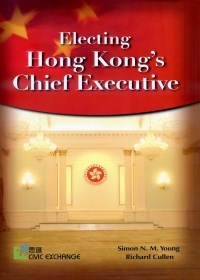- 定價64.00元
-
8
折優惠:HK$51.2

|
|
|
|
Electing Hong Kong's Chief Executive.
|

|

沒有庫存
訂購需時10-14天
|
|
|
|

|
|
9789888028399 | |
|

|
|
Simon N. M. Young and Richard Cullen | |
|

|
|
香港大學出版社 | |
|

|
|
2010年1月01日
| |
|

|
|
295.00 元
| |
|

|
|
HK$ 265.5
|
|
|
|
|

| |
|
|
|
|
| |
|
|
詳
細
資
料
|
|
|
分
類
|
[ 尚未分類 ] |
同
類
書
推
薦
|
|
|
內
容
簡
介
|
In 2007, the Hong Kong Special Administrative Region held its first-ever contested election for Chief Executive, selected by 800 members of an Election Committee drawn from roughly 7% of the population. The outcome was a foregone conclusion, but the process allowed a pro-democracy legislator to obtain enough nominations to contest the election. The office of Chief Executive is as unique as the system used to fill the office, distinct from colonial governors and other leaders of Chinese provinces and municipalities. The head of the HKSAR enjoys greater autonomous powers, such as powers to nominate principal officials for Chinese appointment, pardon offenders and appoint judges. Despite its many anti-democratic features, the Election Committee has generated behavior typically associated with elections in leading capitalist democracies and has also gained prominence on the mainland as the vehicle for returning Hong Kong deputies to the National People's Congress. This book reviews the history and development of the Election Committee (and its predecessor), discusses its ties to legislative assemblies in Hong Kong and Mainland China, and reflects on the future of the system.
Simon N. M. Young is an associate professor and the director of the Centre of Comparative and Public Law in the Faculty of Law, University of Hong Kong. His earlier work on the Hong Kong legislature was published in Functional Constituencies: A Unique Feature of the Hong Kong Legislative Council (Hong Kong University Press 2006). He is currently working on a book on Hong Kong’s Court of Final Appeal.
Richard Cullen is a visiting professor and fellow at the Centre of Comparative and Public Law in the Faculty of Law, University of Hong Kong. Previously he worked in the City University of Hong Kong and Monash University. His areas of research include comparative public law, public law, media law, and comparative tax law and policy. Most of his work over the last 20 years has been focused on Hong Kong and China.
"This is a thoroughly researched account of Hong Kong's most important political office, that of the Chief Executive. It should be read by anyone interested in politics and policy-making in Hong Kong." — Frank Ching
"Everything you ever wanted to know about the peculiar way post-handover Hong Kong picks its top political leader can be found in this well-researched, richly detailed yet very readable book. It guides you through how undemocratic elections work in what is otherwise a free society." — Michael Chugani |
|
|
書
評
|
|
|
|
|

